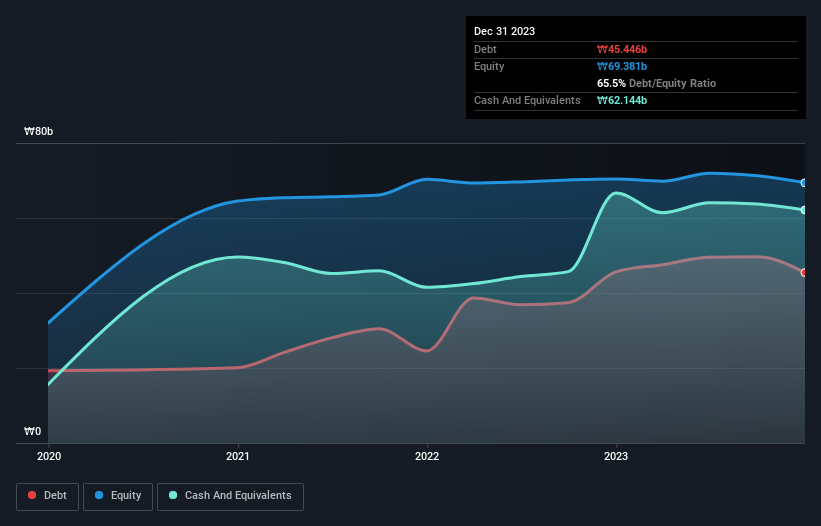
Warren Buffett famously said, 'Volatility is far from synonymous with risk.' It's only natural to consider a company's balance sheet when you examine how risky it is, since debt is often involved when a business collapses. As with many other companies S-Fuelcell co., Ltd. (KOSDAQ:288620) makes use of debt. But the real question is whether this debt is making the company risky.
What Risk Does Debt Bring?
Debt is a tool to help businesses grow, but if a business is incapable of paying off its lenders, then it exists at their mercy. Part and parcel of capitalism is the process of 'creative destruction' where failed businesses are mercilessly liquidated by their bankers. However, a more common (but still painful) scenario is that it has to raise new equity capital at a low price, thus permanently diluting shareholders. By replacing dilution, though, debt can be an extremely good tool for businesses that need capital to invest in growth at high rates of return. When we think about a company's use of debt, we first look at cash and debt together.
Check out our latest analysis for S-Fuelcell
What Is S-Fuelcell's Debt?
As you can see below, S-Fuelcell had ₩45.4b of debt, at December 2023, which is about the same as the year before. You can click the chart for greater detail. But on the other hand it also has ₩62.1b in cash, leading to a ₩16.7b net cash position.

How Healthy Is S-Fuelcell's Balance Sheet?
We can see from the most recent balance sheet that S-Fuelcell had liabilities of ₩71.2b falling due within a year, and liabilities of ₩4.01b due beyond that. On the other hand, it had cash of ₩62.1b and ₩20.0b worth of receivables due within a year. So it actually has ₩6.91b more liquid assets than total liabilities.
This surplus suggests that S-Fuelcell has a conservative balance sheet, and could probably eliminate its debt without much difficulty. Succinctly put, S-Fuelcell boasts net cash, so it's fair to say it does not have a heavy debt load! There's no doubt that we learn most about debt from the balance sheet. But ultimately the future profitability of the business will decide if S-Fuelcell can strengthen its balance sheet over time. So if you're focused on the future you can check out this free report showing analyst profit forecasts.
In the last year S-Fuelcell had a loss before interest and tax, and actually shrunk its revenue by 30%, to ₩33b. That makes us nervous, to say the least.
So How Risky Is S-Fuelcell?
We have no doubt that loss making companies are, in general, riskier than profitable ones. And we do note that S-Fuelcell had an earnings before interest and tax (EBIT) loss, over the last year. And over the same period it saw negative free cash outflow of ₩3.7b and booked a ₩2.3b accounting loss. With only ₩16.7b on the balance sheet, it would appear that its going to need to raise capital again soon. Overall, its balance sheet doesn't seem overly risky, at the moment, but we're always cautious until we see the positive free cash flow. When analysing debt levels, the balance sheet is the obvious place to start. But ultimately, every company can contain risks that exist outside of the balance sheet. Case in point: We've spotted 1 warning sign for S-Fuelcell you should be aware of.
When all is said and done, sometimes its easier to focus on companies that don't even need debt. Readers can access a list of growth stocks with zero net debt 100% free, right now.
If you're looking to trade S-Fuelcell, open an account with the lowest-cost platform trusted by professionals, Interactive Brokers.
With clients in over 200 countries and territories, and access to 160 markets, IBKR lets you trade stocks, options, futures, forex, bonds and funds from a single integrated account.
Enjoy no hidden fees, no account minimums, and FX conversion rates as low as 0.03%, far better than what most brokers offer.
Sponsored ContentNew: Manage All Your Stock Portfolios in One Place
We've created the ultimate portfolio companion for stock investors, and it's free.
• Connect an unlimited number of Portfolios and see your total in one currency
• Be alerted to new Warning Signs or Risks via email or mobile
• Track the Fair Value of your stocks
Have feedback on this article? Concerned about the content? Get in touch with us directly. Alternatively, email editorial-team (at) simplywallst.com.
This article by Simply Wall St is general in nature. We provide commentary based on historical data and analyst forecasts only using an unbiased methodology and our articles are not intended to be financial advice. It does not constitute a recommendation to buy or sell any stock, and does not take account of your objectives, or your financial situation. We aim to bring you long-term focused analysis driven by fundamental data. Note that our analysis may not factor in the latest price-sensitive company announcements or qualitative material. Simply Wall St has no position in any stocks mentioned.
About KOSDAQ:A288620
S-Fuelcell
S-Fuelcell Co., Ltd. provides fuel cell systems, hydrogen generation systems, and fuel conversion devices.
Adequate balance sheet very low.
Market Insights
Community Narratives




